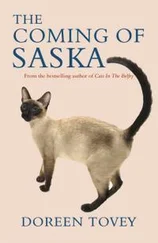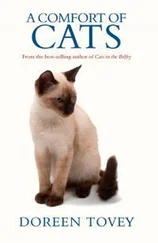Fired, we imagined, by a desire that her kittens should all be Seal Points like Rikki – a real Yul Brynner of a cat he had been, with massive black shoulders and a wicked, wedge-shaped head – she also drank more coffee than it seemed possible a cat could hold, and, for some unfathomable reason, took to chewing paper; a habit which, the day she ate Charles's Aunt Ethel's telegram, landed us in serious trouble.
Charles's Aunt Ethel, when she decided to stay with members of the family, always announced her impending arrival by telegram; that way the family had no chance to get out of it. In our case, as we lived, as she was always telling us, at the back of beyond, the telegram also contained the time of the train so that Charles could drive over to the station and collect her.
When, therefore, she appeared dramatically on the doorstep one cold wet night, looking grimly at us over the top of her streaming pince-nez and announcing that not only had she Waited in Vain for a whole hour at the junction but the taxi she had then been Forced to Take had broken down at the end of the lane (it always did for strangers; Fred Ferry had no intention of taxing his springs on our potholes if he could help it), it was obvious that we were for it.
She wouldn't believe we hadn't had the telegram. She had Sent It, she said, and that was that. It didn't help, either, when Charles rang the post office – rather irately, to impress Aunt Ethel – and asked what the devil they'd done with it. The postmaster, who was a man of spirit, said what the devil did we think? Pushed it under the door himself he had, while he was out for a walk, and had his hand grabbed by a blasted cat. Why, he wanted to know, couldn't we have a letter-box, like ordinary normal people?
We did have a letter-box. It was, as the regular postman knew, in the kitchen door. Charles had transferred it from the front door after Blondin nearly decapitated himself one day through sticking his head nosily through the flap and not being able to get it back. If the telegram had been put by mistake under the front door, Charles told the astonished postmaster, only one thing could have happened. Our cat must have eaten it.
She had. While she watched strategically from the top of the stairs and Aunt Ethel dramatically waited for an explanation at the bottom we found the incriminating evidence – a soggy, well-chewed corner of the envelope – under the hall chair.
What happened then was little short of miraculous. Aunt Ethel was just about to storm out in high dudgeon – she had never liked our animals very much since the day Blondin light-heartedly deposited a small warm trickle down her neck while she was dozing in a chair and this, she informed us icily, was the Last Straw – when Sugieh got up and lumbered slowly down the stairs.
By this time she had a figure like a pear-drop, though up till now it didn't seem to have inconvenienced her very much. Only the previous week she had gone across the garden so fast after a bird she had run into a cloche and cut her nose. Not seriously; just enough to send her even more cross-eyed than usual for a few days looking at the scar. She still, too, climbed trees like the wind without any apparent ill-effect on anybody except Charles who groaned and clutched his head every time she banged her – we hoped – valuable cargo of kittens against a branch.
Now, to our utter astonishment, she crept wearily downstairs as if she could hardly drag herself along, looked Aunt Ethel pathetically in the eye and said 'Waaah!'
Maybe her discomfort was genuine. Maybe it was the result of eating that orange envelope. At any rate we had no more trouble that visit. By night Aunt Ethel slept with Sugieh cradled in her compassionate arms. By day she nursed her on her lap, tenderly stroking her ears and telling her what wicked owners she had, to let the poor little darling be taken advantage of like that.
The poor little darling, wallowing in sympathy as only a Siamese can, acquiesced soulfully in everything she said. To listen to her she had never ever wanted to get married, and we had dragged her down to Dorset by the hair of her innocent little head.
We didn't care. For the first time in months – what was more with Sugieh and Aunt Ethel in the house – we had a little peace.

SIX
Enter Four Gladiators
Sugieh had her kittens at the end of March. After a harrowing evening trying to persuade her to have them in a cardboard box lined with newspaper, as recommended by the cat book, while she just as persistently kept getting out of it and marching upstairs flat-eared with indignation at the very idea, they were born just after midnight. On our bed – otherwise, she said, she wouldn't have them at all – while Charles and I sat either side of her, cat book in hand, anxiously awaiting complications.
There were none. Except for the fact that the last one to arrive was half the size of the other three – and that as Charles pointed out to her, was entirely her own fault; he had warned her often enough about rushing up those trees – everything went off quietly, efficiently and speedily.
It was the last time anything was to go off quietly in our house for a long time to come. The next morning we awoke to the depressing discovery that Sugieh, who never did anything by halves, had decided to become the Perfect Mother.
That, while it lasted, was purgatory. For the first few days she hardly left the kittens for a moment. When she wanted food she stood at the top of the stairs and shouted. When we took it up to her she was either back in her basket feeding them as though they were delicate lilies about to fade before her very eyes, or pacing anxiously up and down like a commercial traveller with a train to catch.
The kittens weren't much help either. The only time we did persuade her to come down with us for a while she had hardly had time to cross her eyes at Shorty in the old familiar way before there was a piercing wail from above and she was off up the stairs two at a time shouting look what happened when she left them for a Moment. Now they were being Kidnapped!
Nobody outside a lunatic asylum would have wanted to kidnap that lot, and well she knew it. From the moment they solemnly opened one eye each, days before they should have done, and leered forth at the world like a lot of piratical Fu Manchus it was obvious that they were up to no good. It gave the act a wonderful fillip, though. Much better than the perfect mother, Sugieh was now the perfect mother defending her children from the kidnappers.
Nobody was free from suspicion on this score. When the Rector came to tea she no longer sat on his knee and shed affectionate hairs on his best black trousers. She stayed in the hall giving him sinister looks round the door. When the butcher's boy arrived, instead of running out ahead of everybody else to have a private word about the liver, she glared at him from the window bawling One step Nearer and she'd call the Police.
When the police did come, in the shape of PC McNab bearing a summons for Charles who had, not surprisingly, driven into town one morning in a coma and left the car under a no-parking sign for two hours, she kicked up such a fuss we weren't at all surprised to see McNab bring out his notebook as soon as he got out into the lane and make an entry that undoubtedly related to breaches of the peace. And when Aunt Ethel came for the weekend specially to see the kittens and we brought them downstairs thinking she at any rate would be all right because she was a friend of Sugieh's, Sugieh nearly went mad.
One after another, as fast as she could, she grabbed the kittens by the scruff of the neck and rushed them dramatically back to the spare room. At bedtime every night for the past year she had complained loudly and bitterly that the spare room was a Vile Prison and she might just as well be Marie Antoinette. Now, it seemed, it was the only place in the world where her kittens were safe. When Aunt Ethel followed apologetically after her with the basket and an odd kitten she had found on the stairs Sugieh, standing bravely on guard in the doorway, growled at her so realistically with her tail bushed and the Siamese fighting ridge raised down her back that Aunt Ethel came downstairs faster than I have ever seen her move in her life and caught the next train home.
Читать дальше


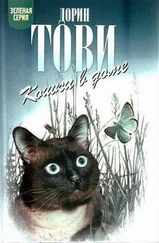

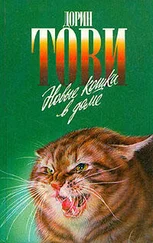
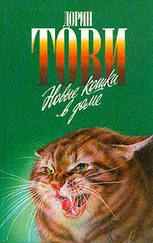




![Дорин Тови - Кошачьи хлопоты [сборник]](/books/412213/dorin-tovi-koshachi-hlopoty-sbornik-thumb.webp)
